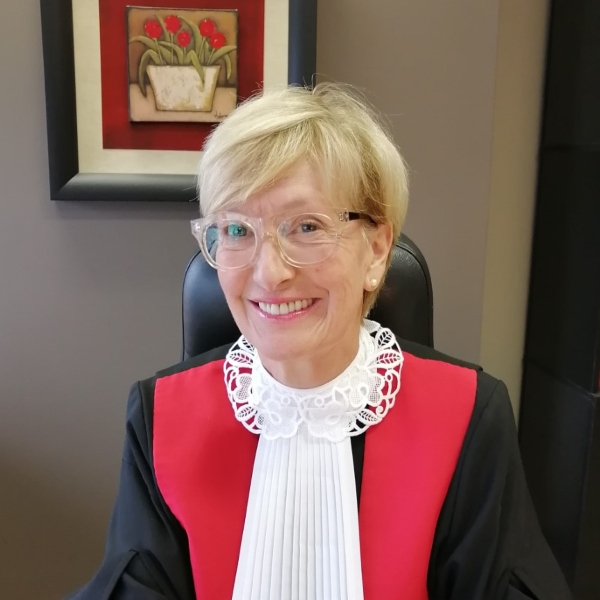The Honourable Carole Hallée
 WHAT WAS YOUR PATH INTO LAW AND ONTO THE BENCH?
WHAT WAS YOUR PATH INTO LAW AND ONTO THE BENCH?
I’m originally from the Témiscamingue region, more specifically from Ville-Marie, which is a small town with a gorgeous courthouse. My father had an office in the building since he worked there at different times as a bailiff, a court usher, a court clerk, a sheriff and a prothonotary, as it was called at the time. The elementary school I went to was right across from the courthouse. At the end of the school day, I would head over to my father’s office and follow him around as he attended to his different tasks. I would go into the courtroom whenever he was there, and I’d sit there and listen for hours, completely fascinated. During recess or at the end of a hearing, the judge, who knew me a little, would motion to me and I’d go into his little office connected to the courtroom. I can’t say how many times he’d asked my opinion about a case, knowing full well that I had no idea of the stakes involved. I would basically just boil it down what was good and what was bad. I’ve wanted to be a lawyer and represent clients in court from a very young age, but I would say that the memory that looms largest in my mind is something I would always repeat to my father and to anyone who would listen: “One day, I’ll be the one sitting in the judge’s big chair.” That childhood dream eventually became a reality. I specifically remember, while in CEGEP, telling a friend of mine on one of our many weekend walks in Old Montréal that I’d have an office in that building someday ― “that building” being the Montréal courthouse. I’m incredibly grateful to my parents for everything they did to make sure I could study law. I started my studies at Collège Bois-de-Boulogne and finished at the Université de Sherbrooke. After my internship, I started working at a family law firm, where I stayed until I was appointed to the Superior Court on November 7, 2001. November 2023 will mark my 22nd year on the Superior Court. I still have to pinch myself, even after all these years. I still love my work and it’s been such a privilege to have been elevated to the bench.
WHAT EXPERIENCE IN YOUR LEGAL CAREER BEST PREPARED YOU FOR WORK ON THE BENCH?
I would say, without a doubt, that spending two or three times a week representing people in court on a regular basis was great preparation for being a judge. It made me intimately familiar with the inside of a courtroom. In my time practicing family law, I regularly drafted legal procedures and opinions and was in close contact with clients. I’ve always brought enthusiasm and passion to my work as a lawyer. I loved pleading cases, but my main concern was being able to understand what my clients needed so they could feel good about what the future had in store. That was my primary goal as a family lawyer. My experiences in court and getting to meet a wide range of people definitely helped me in my work as a judge. It also serves as a daily reminder of what litigants expect from a judge.
WHAT ADVICE DO YOU HAVE FOR COUNSEL WHO APPEAR BEFORE YOU?
Now, more than ever, what defines a good lawyer is one who is willing to act in the litigants’ best interest. A lawyer shouldn’t just parrot their client’s instructions and explain the strengths and weaknesses of their case. Good counsel should know their case through and through and be prepared, to the extent possible, for all eventualities. It’s also important to be respectful, both to the court and the opposition.
WHAT DO YOU WISH THE PUBLIC KNEW ABOUT THE JUSTICE SYSTEM?
I’m proud to be a part of the Canadian justice system. I firmly believe in the independence and impartiality of our judiciary. A judge’s work isn’t limited to hearing cases. We also carry out legal research, work to advance the law and, above all, ensure justice is fairly served for all litigants, who sometimes have to wait many long months before getting their chance to be heard. The pandemic forced judges to quickly adapt to a new digital reality to ensure delays were kept at a minimum and litigants could continue to be heard.